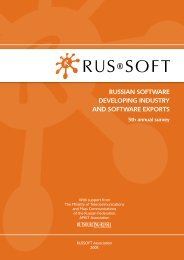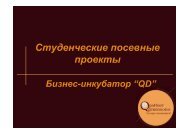russian software developing industry and software exports
russian software developing industry and software exports
russian software developing industry and software exports
Create successful ePaper yourself
Turn your PDF publications into a flip-book with our unique Google optimized e-Paper software.
Chapter 1.<br />
Position of Russia in the Global Market of Software<br />
<strong>and</strong> Software Development Services<br />
<strong>and</strong> markets of maximum sales. Interestingly, only<br />
around 10 of 20-25 major Russian <strong>software</strong> exporters<br />
actively communicate with journalists abroad.<br />
Probably, some do not track publications or do not<br />
put links on their websites. However, there can be<br />
only few of such cases. As a rule, companies having<br />
professional PR-managers in their staff perform<br />
intensive monitoring of publications.<br />
Often what poses an obstacle for the news<br />
about a Russian company to appear in international<br />
Mass Media is the condition of non-disclosure of<br />
information stated in the contract or the project by<br />
the customer. For instance, the company DevExperts<br />
that specializes in <strong>software</strong> development for trading<br />
on a stock exchange <strong>and</strong> financial markets has no<br />
links to publications in American press because its<br />
USA partners consider confidential the information on<br />
solutions <strong>and</strong> platforms used.<br />
Another problem is that in the majority of<br />
publications the links to which are provided by<br />
Russian companies these companies do not position<br />
themselves as Russian companies per se or try not to<br />
frequently mention the country of origin. For example,<br />
Parallels calls itself a transnational company. Its founder<br />
is a Russian immigrant who received citizenship of<br />
Singapore. The headquarters of Parallels are located<br />
in Switzerl<strong>and</strong>. At the same time, the majority of<br />
company’s developers are working in Russia.<br />
There are quite many instances when the<br />
company affiliation with a certain country is difficult<br />
to determine. In this survey companies are considered<br />
Russian if they have a legal entity registered in Russia<br />
<strong>and</strong> <strong>software</strong> development is mainly performed<br />
in Russia.<br />
But even purely Russian companies are rarely<br />
involved in the promotion of their native country in<br />
the global <strong>software</strong> market. This mainly concerns<br />
developers of <strong>software</strong> products produced for wide<br />
groups of users who do not associate Russian with the<br />
development of high-quality goods <strong>and</strong> products. If<br />
we speak of major customers, more often than not<br />
their managers are free of such associations. They<br />
know the strengths of Russian programmers <strong>and</strong> that<br />
Russia has successfully solved many complex technical<br />
tasks (e.g. related to implementation of space<br />
programs).<br />
Thus, there is a vicious circle. Companies do not<br />
want to mention their origin for fear that it may<br />
cause reduction of sales. At the same time their<br />
achievements in international markets cannot change<br />
the negative attitude to Russia since ordinary users<br />
do not correlate this success with Russian developers.<br />
Finally, the negative image leads to the situation when<br />
companies do not emphasize that solutions promoted<br />
abroad were created in Russia.<br />
This circle can <strong>and</strong> must be broken if we want<br />
Russian economy to become less dependent on<br />
world prices on raw materials through the increase<br />
of export share of high-tech companies. Probably, in<br />
this case a strong marketing support of state bodies is<br />
absolutely vital.<br />
The issues of the country image affects the<br />
export of high-tech companies representing various<br />
industries, <strong>and</strong> they cannot be solved by industrial<br />
groups since they have limited resources compared<br />
to governmental structures (here we would remind<br />
that in 2009 the budget allocated to promote the<br />
favorable image of Russia abroad amounted to<br />
USD 1.4 bn !!!), but without their participation the<br />
effectiveness of state funds to advance Russia in the<br />
global market is extremely low.<br />
The conclusion regarding cooperation with the<br />
press is as follows: last year the number of publications<br />
considerably increased, but the number of records for<br />
Russian companies <strong>and</strong> <strong>software</strong> <strong>industry</strong> in foreign<br />
Mass Media can be at least several times more. Many<br />
companies (even quite large) are not involved in<br />
any PR activities. Moreover, there is no substantial<br />
marketing support on the part of the State.<br />
Russia is far better represented at conferences <strong>and</strong><br />
research on outsourcing in <strong>software</strong> development.<br />
If in international press publications mentioning<br />
<strong>software</strong> development in Russia are only occasional,<br />
any conference without participants from Russia<br />
cannot claim its international status. All surveys on<br />
global outsourcing market also necessarily mention<br />
Russia (sometimes together with Eastern Europe) as<br />
an alternative to India.<br />
The Indian association NASSCOM on its website<br />
constantly refers to Russia <strong>and</strong> China as India’s main<br />
competitors. For example, the section of last year’s<br />
achievements says that Indian developers managed<br />
to increase <strong>exports</strong> despite the competition with<br />
Chinese <strong>and</strong> Russian companies.<br />
Leading research companies, unlike journalists,<br />
are quite objective evaluating advantages <strong>and</strong><br />
disadvantages of individual states. Unfortunately,<br />
they still fail to segment the world market of<br />
outsourcing services to clearly highlight the segment<br />
where Russian positions are particularly strong, <strong>and</strong><br />
namely complex science-intensive projects requiring<br />
deep mathematical knowledge of specialists. If this<br />
segment could be measured <strong>and</strong> the share of every<br />
country determined, it is quite possible that Russian<br />
developers would be the leaders by total <strong>exports</strong>.<br />
To repeat, analysts (probably due to the lack of<br />
objective information) often exaggerate certain<br />
problems in Russia. Thus, they think that by indicator<br />
of political <strong>and</strong> economic stability it lags behind its<br />
main competitors. But as a rule the evaluation of<br />
advantages <strong>and</strong> disadvantages based on different<br />
criteria leaves no doubts.<br />
Ratings of Research Companies<br />
Russian <strong>software</strong> developers have been<br />
represented in international ratings of the best world<br />
service companies since 2002. Over this period the<br />
10








